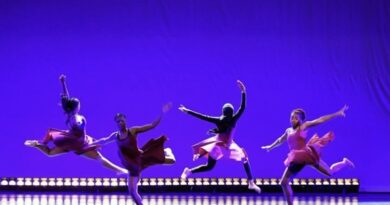Bikini Kill is Back!
You’d be wrong if you thought 30 years could take the spirit and spunk out of the famous 90’s “riot grrrl” band Bikini Kill. If you’ve seen the movie “Moxie,” you’ve heard their popular track “Rebel Girl” playing in the background of several scenes. Despite rising to fame decades ago, Bikini Kill’s concert attracted older and younger fans, coming together to enjoy a night of alternative rock.
Bikini Kill is a punk rock band that was formed in October 1990 and released three albums between 1991 and 1996. Known for albums such as “Revolution Girl Style Now!” and “Reject All American,” the band pioneered the “Riot Grrrl” movement, a 90’s feminist punk movement combining feminism, politics, and punk rock music. Containing lead singer Kathleen Hanna, drummer Tobi Vail, guitarist Billi Karren, and bassist Kathy Wilcox, Bikini Kill significantly influenced alternative rock bands of the 20th and 21st centuries.
I walked into the Fillmore on April 7 just as the opening band began performing, spreading their enthusiastic energy throughout the crowd. Because I don’t want this article to be restricted by MCPS, I cannot say the name of this band, but if you look up bands with the word “Mannequin” or search for the Silver Spring Bikini Kill concert, you’ll probably find exactly who I’m talking about. I went to the concert with my older cousins and junior Amy Berger, who has designated herself as my resident concert buddy. Immediately, I felt an energy of excitement coming from everyone in the room. Although we were all pretty squished together in the pit of the room, everybody was dancing, headbanging, and jumping like a typical rock concert. The previous concerts I’ve been to always had calmer, indie vibes, so this experience was invigorating in contrast to what I previously knew about concerts.
After the opening performance, Bikini Kill came onto the stage and began their set with “Double Dare Ya,” a hit from their self-titled EP of 1992. I have to give a shoutout to the lighting department at the Fillmore, because it matched the mood perfectly, changing colors and flashing with the crucial parts of each song. The band sang over twenty songs throughout the night, including “Alien She,” “Resist Psychic Death,” and “Demi Rep.” While Bikini Kill hasn’t released any music in recent years, their older hits were still well known throughout the audience as people screamed the lyrics back to the band.
In between songs, lead singer Kathleen Hanna took opportunities to tell personal stories and connect with the audience. She mentioned that she actually grew up in Silver Spring and knew the area well, a fact that I hadn’t known until that night. She mentioned that she and her friends used to hang out around Wheaton Mall (now Westfield Wheaton) and that her little sister went to Bethesda Chevy Chase High School. It was interesting to learn about how her experiences throughout her young adulthood helped form some of the band’s most well-known songs, and how they influenced Hanna’s songwriting overall.
One thing that really made this concert stand out to me was the discussion of unjust government officials and the high levels of discrimination faced by people of color and trans people in the United States. While the Riot Grrrl movement is known for promoting female leads in music, the movement often failed to recognize these groups and even excluded them, contradicting their feminist values. White, cis female artists were at the forefront of the Riot Grrrl movement, which led the target audience to consist mostly of white suburban teenagers. Multiple accounts from women of color discuss being left out of the movement and feeling as though it was only for white women. How can we expect a feminist movement to be entirely inclusive if the leading ladies are all white, cis, straight women? The opening band and Bikini Kill both had several conversations between their songs about the nation’s state and how people of marginalized groups are still not being treated equally, even in the 21st century.
Everybody at the concert was expecting Bikini Kill to sing “Rebel Girl,” arguably their most popular song ever released. So when the band announced “Lil’ Red” as their final song, the audience wondered why they wouldn’t sing “Rebel Girl.” The crowd buzzed with confusion as the band left the stage, and I turned to Amy and my cousins, who seemed to be just as puzzled. But thankfully, the band came back on stage just a few moments later, playing “Rebel Girl” as an encore and the true final song of the concert. If the audience was singing along to any song that night, this was the song. Personally, I was singing them at the top of my lungs, dancing with Amy and my cousins. It was truly the cherry on top of a perfect night with an incredibly influential band.




